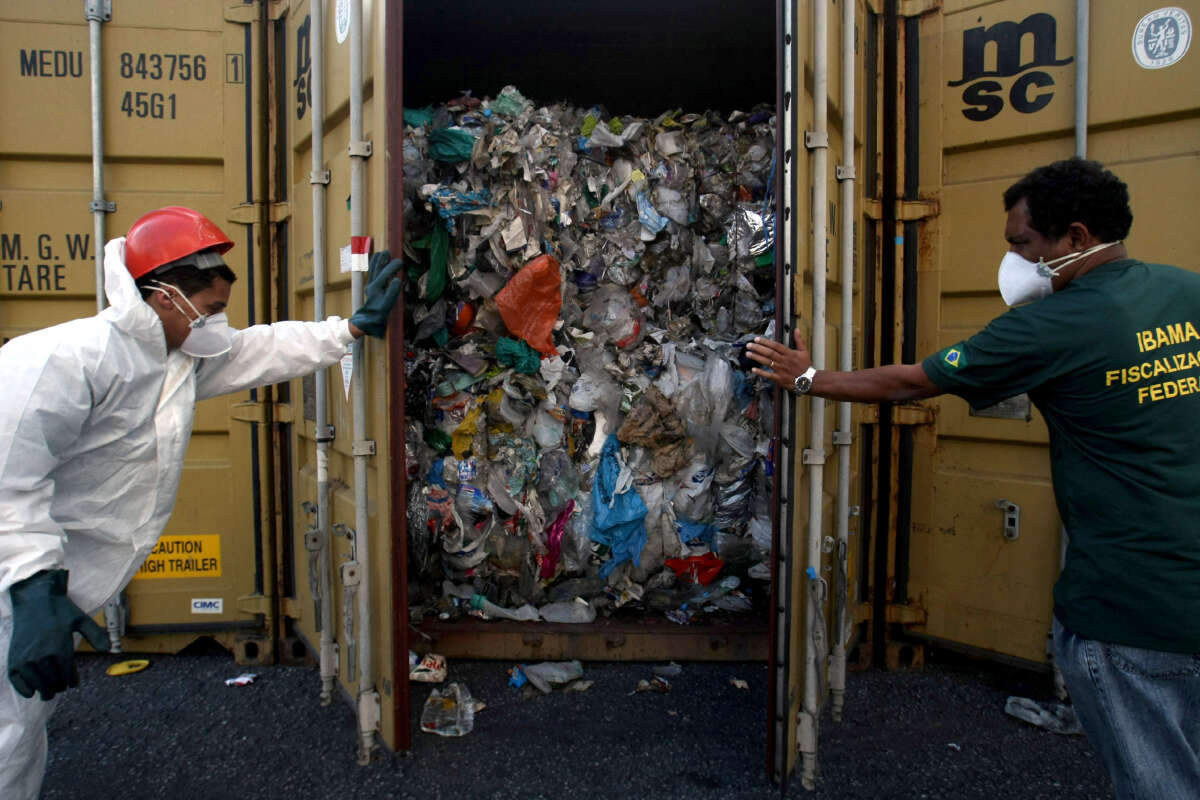Did you know that Truthout is a nonprofit and independently funded by readers like you? If you value what we do, please support our work with a donation.
High-income countries have long sent their waste abroad to be thrown away or recycled — and an independent team of experts says they’re inundating the developing world with much more plastic than previously estimated.
According to a new analysis published last week, United Nations data on the global waste trade fails to account for “hidden” plastics in textiles, contaminated paper bales, and other categories, leading to a dramatic, 1.8-million-metric-ton annual underestimate of the amount of plastic that makes its way from the European Union, Japan, the United Kingdom, and the United States to poor countries. The authors highlight the public health and environmental risks that plastic exports pose in the developing world, where importers often dump or incinerate an unmanageable glut of plastic waste.
“Toxic chemicals from these plastics are poisoning communities,” said Therese Karlsson, a science and technical adviser for the nonprofit International Pollutant Elimination Network, or IPEN. IPEN helped coordinate the analysis along with an international team of researchers from Sweden, Turkey, and the U.S.
Many estimates of the scale of the plastic waste trade make use of a U.N. database that tracks different types of products through a “harmonized commodity description and coding system,” which assigns each product category a code starting with the letters HS. HS 3915 — “waste, parings, and scrap” of plastics — is often assumed by researchers and policymakers to describe the total volume of plastic that’s traded globally. But the new analysis argues this is only “the tip of the plastic waste iceberg,” since HS 3915 misses large quantities of plastic that are included in other product categories.
Discarded clothing, for example, may be tracked as HS 5505 and not counted as plastic waste, even though 60 to 70 percent of all textiles are made of some kind of plastic. And another category called HS 6309 — used clothing and accessories — is assumed by the U.N. to be reused or recycled and is therefore not considered waste at all, even though an estimated 40 percent of these exported clothes are deemed unsalvageable and end up dumped in landfills.
Plastic contamination in paper bales — the huge stacks of unsorted paper that are shipped abroad to be recycled — also tends to be overlooked in estimates of the international plastic waste trade, even though these bales may contain 5 to 30 percent plastic that must be removed and discarded.
Accounting for plastic from just these two product categories increases plastic waste exports from all the regions analyzed by as much as 1.8 million metric tons per year — 1.3 million from paper bales and half a million from textiles. That’s more than double the plastic that’s counted when only plastic “waste, parings, and scrap” are analyzed.
Additional product categories like electronics and rubber add even more to the global plastic waste trade, although Karlsson said a lack of data makes it hard to quantify their exact contribution. All this plastic strains developing countries’ waste management infrastructure, leading to large quantities of plastic waste ending up in dumps, landfills, or incinerators. Burning this waste causes hazardous air pollution for nearby communities, and dumps and landfills can leach chemicals like PCBs — a group of compounds that can cause cancer in humans — into soil and water supplies.
More than 10,000 chemicals are used in the production of plastic, and one-fourth of them have been flagged by researchers for their toxicity and potential to build up in the environment and in people’s bodies. The report calls for greater transparency from plastic and petrochemical industries about the chemicals they put in their plastic products, and for regulators to require them to use fewer, nontoxic chemicals.
Karlsson also called for a total ban on the global plastic waste trade, along with enforceable limits on the amount of plastics the world makes in the first place. “Regardless of what way we’re handling plastic waste, we need to decrease the amount of plastics that we generate,” she told Grist, “because the amount of plastic waste being produced today will never be sustainable.”
Without aggressive action to phase down plastic production, the world is on track to have produced a cumulative 26 billion metric tons of plastic waste by 2050, most of which will be incinerated, dumped, or sent to landfills.
This article originally appeared in Grist.
Grist is a nonprofit, independent media organization dedicated to telling stories of climate solutions and a just future. Learn more at Grist.org
Press freedom is under attack
As Trump cracks down on political speech, independent media is increasingly necessary.
Truthout produces reporting you won’t see in the mainstream: journalism from the frontlines of global conflict, interviews with grassroots movement leaders, high-quality legal analysis and more.
Our work is possible thanks to reader support. Help Truthout catalyze change and social justice — make a tax-deductible monthly or one-time donation today.
